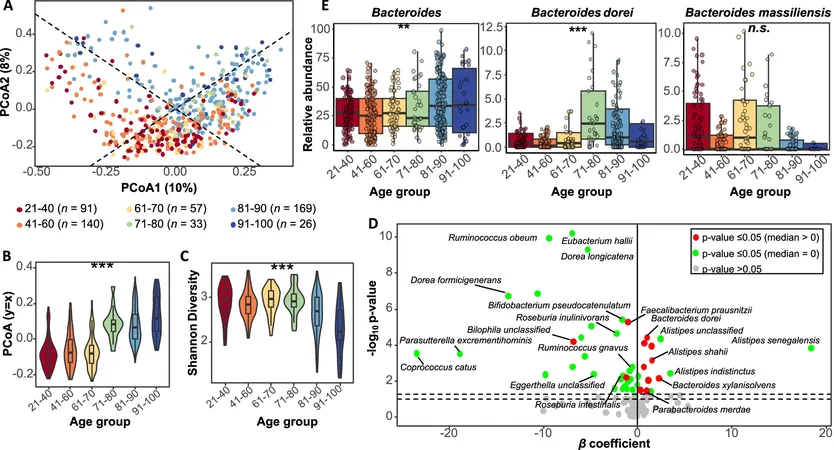
Unlocking the Secrets of Aging: How Gut Bacteria Could Hold the Key to Healthy Longevity
2024-11-07
Author: Jia
A groundbreaking study from researchers at the Agency for Science, Technology and Research Genome Institute of Singapore (A*STAR GIS) has shed light on the mysterious role of gut bacteria in the aging process. This extensive research, conducted in collaboration with various institutions, highlights specific microbes that could potentially be targeted to foster a healthier aging experience.
As the aging population in Singapore continues to rise, understanding the underlying factors of aging has become a critical focus. The study finds that aging is not only a biological process but also significantly influenced by dietary and lifestyle choices, with gut health emerging as a pivotal element. The team focused on examining the gut microbiome of over 200 octogenarians (aged 80-89) to unravel changes that occur as we grow older.
Using advanced DNA sequencing technology, the researchers unveiled a striking decline in gut bacterial diversity with age. A particularly alarming finding was the notable reduction in Faecalibacterium prausnitzii, a vital bacterium known for producing butyrate, a short-chain fatty acid essential for maintaining gut integrity, reducing inflammation, and even aiding in communication between the gut and the brain.
Interestingly, the study also observed that as F. prausnitzii dwindled, there was an increase in Alistipes and Bacteroides species. These bacteria seem to take up the mantle, utilizing alternative energy sources to continue producing butyrate. This metabolic shift may serve as a compensatory mechanism, potentially enhancing the gut's ability to function effectively in elderly individuals.
The researchers didn’t stop at examining the human microbiome; they extended their analysis to preclinical models of healthy aging. Remarkably, despite the differences in gut bacteria among various species, they found striking similarities in the functional roles these bacteria play, particularly relating to butyrate production. This suggests that the benefits of gut health may transcend species, opening doors for wider applications in health science.
Moreover, the study connected gut bacterial changes with vital health markers such as inflammation and blood sugar levels. Notably, they identified Parabacteroides goldsteinii as a promising probiotic, correlated with improved fasting blood glucose levels, and attributed certain gut species like Streptococcus parasanguinis and Bacteroides coprocola to healthier serum Vitamin B12 levels. Such findings indicate these microbes could serve as biological markers for assessing healthy aging.
As they look ahead, the research team is excited to delve deeper into the metabolic pathways of identified microbial strains. Their ultimate goal is to develop innovative probiotic and prebiotic therapies tailored to enhance gut health and, by extension, healthy aging.
Aarthi Ravikrishnan, the lead scientist, emphasized the study's potential impact: "Our findings provide invaluable insights into the gut microbiome and age-related metabolic shifts, paving the way for significant advancements in understanding and promoting healthy aging, especially in Asian populations."
Associate Professor Niranjan Nagarajan echoed this sentiment, stating that these discoveries could transform the landscape of aging-related therapies, allowing for targeted interventions that leverage gut microbiome modifications to encourage longevity.
With the secrets of gut health and aging beginning to unravel, one can only wonder: Could these tiny microbes be the ultimate key to aging gracefully? Stay tuned as science continues to unlock the mysteries behind our complex biology!


 Brasil (PT)
Brasil (PT)
 Canada (EN)
Canada (EN)
 Chile (ES)
Chile (ES)
 Česko (CS)
Česko (CS)
 대한민국 (KO)
대한민국 (KO)
 España (ES)
España (ES)
 France (FR)
France (FR)
 Hong Kong (EN)
Hong Kong (EN)
 Italia (IT)
Italia (IT)
 日本 (JA)
日本 (JA)
 Magyarország (HU)
Magyarország (HU)
 Norge (NO)
Norge (NO)
 Polska (PL)
Polska (PL)
 Schweiz (DE)
Schweiz (DE)
 Singapore (EN)
Singapore (EN)
 Sverige (SV)
Sverige (SV)
 Suomi (FI)
Suomi (FI)
 Türkiye (TR)
Türkiye (TR)
 الإمارات العربية المتحدة (AR)
الإمارات العربية المتحدة (AR)